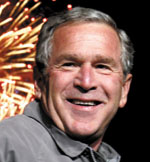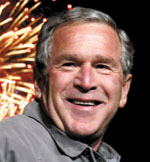
Bush? Kerry? Many Yemenis feel they’re the sameWho wins? Who cares? [Archives:2004/786/Front Page]
November 1 2004
 |
Some Yemenis that spoke to Yemen Times concerning the effects on Yemen and the Middle East region following the election have placed some hope on Kerry. Some expressed fear that Bush may continue to carry out military action in the area following the US invasion in Iraq.
“Bush might be worse because he appears to be an aggressive military leader, and he will not have to worry about being re-elected,” said Yahya, a student at Sana'a University. “Kerry seems to be more logical while Bush is rash. Kerry might be more cautious carrying out actions abroad.”
Others are betting on Kerry to follow the footsteps of the last Democratic president Bill Clinton. Clinton made an attempt of bringing peace to the Palestinians and Israelis and establishing a Palestinian state while Bush has shown little effort to end ongoing clashes.
Continued on page5
“Kerry may see the benefits Clinton saw in ending the struggle in Palestine,” said a Yemeni businessman. “It would help improve the image of the United States in the Arab world.”
But many believe that the outcome of the election will not change US foreign policy in the Middle East.
“My opinion is that whether Kerry or Bush gets elected, no significant change would occur on US policy towards the Middle East,” said Saad S. Khan, an author and widely read analyst on governance and policies in the Muslim world.
“Kerry would not be able to extricate his forces out of Iraq, for instance, better than Bush. Support for Saudi Arabia and other Middle East monarchies, as well as unstinted backing of Israel, would continue. Change of face at the White House may not and cannot change the nature of US interests in the region.”
One Yemeni believes that the Jewish lobby group in Washington, D.C., will have influence on either candidate that wins which will keep the United States in the position of supporting Israel.
“It doesn't matter who wins the election. Jewish influence in Washington will go on, no matter who is the president,” said the Yemeni.
And as security in Iraq continues to deteriorate, few believe that neither Bush nor Kerry will be able to withdraw US troops in the near future.
“It's now impossible for the United States to leave Iraq because it is in chaos,” said Yahya.
He added that the he has doubts about Bush wanting to leave the war-ravaged country but hopes that if Kerry wins he will plan to withdraw as soon as possible.
“I think Bush wants to occupy Iraq to control the oil and use the country as a strategic location to strike other countries whenever he wants to,” said Yahya. “I think that whether the United States has a Republican or a Democratic president, the US policy in the Middle East will not change. But Kerry might realize that leaving US soldiers in Iraq will be too dangerous and will cost a lot of lives.”
As the election gets closer, the two candidates on the campaign trail have been focusing on a wide range of issues, including the economy, healthcare and social security. The heated debate, however, still rests on the war in Iraq and the war on terror.
Kerry continues to accuse Bush that he mismanaged the war, misled the US public to support the invasion and the war, with no end in sight, made America more vulnerable to terrorist attacks.
Bush has come back by claiming Kerry is not equipped to fight the war on terror and that he has changed his position on the war in Iraq which makes him appear to be indecisive.
But while US actions in the Middle East are the center of attention leading up to the election, many in Yemen believe that US policy in the Arab world is not likely to change regardless of who wins.
——
[archive-e:786-v:13-y:2004-d:2004-11-01-p:front]


